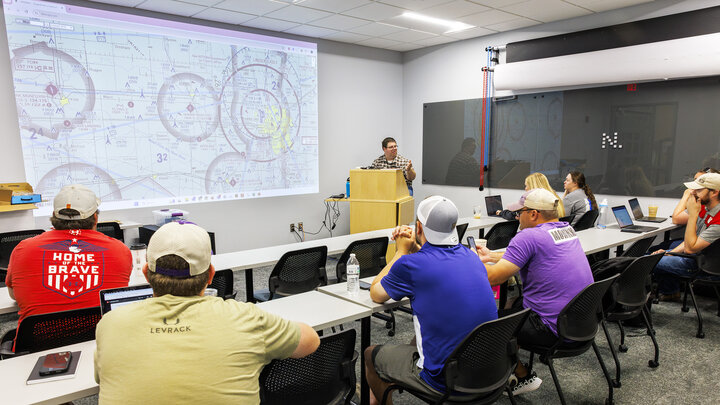Nebraska Innovation Studio pilots drone course with educators

A new drone class has participants flying high at the University of Nebraska–Lincoln.
Eight area educators took part in a three-day drone operating course for teachers, which is aimed at preparing them for the FAA Aeronautical Knowledge Test, also known as the Part 107 exam — the required test to operate drones commercially. Two-day public courses will be offered, beginning July 1-2. Classes will be held every six to eight weeks at Nebraska Innovation Studio, which is part of the university’s Nebraska Innovation Campus.
Travis Ray, program coordinator at Innovation Studio, is teaching the classes and said the program is designed to cover all the information contained in the Part 107 and includes hands-on flying time.
“We cover everything from weather to airspace, laws regarding drones and provide resources to take them into the future, because the laws and regulations are changing all the time,” Ray said. “Our class is different in that we do offer flying time, because we think it’s valuable to give people some time flying a drone to understand how they work, what it looks like to fly up to the 400-foot limit and see some of these regulations in practice.”
Those who complete the course can proceed to take the Part 107 exam at an FAA-registered site.
The effort is part of the Heartland Robotics Cluster, which was established following a grant from the U.S. Department of Commerce’s Economic Development Administration in 2022. The cluster is a collaboration of the university, the College of Engineering, Invest Nebraska, the Combine, Nebraska Manufacturing Council, Nebraska Extension, Northeast Community College, and Metro Community College to expand training, research and implementation of robotics and grow Nebraska’s economy.
“Drones are flying robots, and their use is quickly expanding in many industries,” Ray said. “You have to have a commercial license if you’re using drones for your job.”
Ray pointed to growing uses in construction, structural engineering, real estate, precision agriculture, entertainment and media — all of which require a commercial operator’s license.
The educators’ course was expanded to three days to incorporate information about earning a recreational drone operator license, which may be useful for teachers to offer for their students.
“This particular class was part of our teacher professional development series,” Ray said. “My background is in science and computer science education, and drones are programmable through those same computer science principles, so they’re a cool way for students to experiment with programming.”
Nick Ristau, a secondary math teacher from Milford Public Schools, attended the educator session. He’s used drones in a past Career and Technology Education course, which explores various careers as well as computer programming and other technical skills. He said the session expanded his thinking about how he could use the technology more in the classroom and beyond.
“We started with them in a robotics class, and then we tried them in broadcasting and photography,” Ristau said. “With the way some industries are going, and we have some students very interested in this, I could see us developing a piece of dedicated curriculum to help them work on their recreational and then commercial licenses.”
For Taryn Miller, taking the course was a way to further prepare her for student teaching this fall in Blue Hill, Nebraska. She will graduate from Nebraska in December with a bachelor’s degree in agricultural education.
“This was a way to get more skills in a technical sciences area, and as an ag teacher, I wanted more exposure to this area,” Miller said. “I have never flown a drone before, so this is all very new to me, but having my license will definitely make me more competitive for jobs.”
Miller said she was already thinking about ways to use drones in her classes, as drones are already a huge part of agriculture and that their uses will keep growing.
“You can incorporate them into every sector,” she said. “I’m thinking about crop scouting, checking on animals on large ranches, making sure pivots are working correctly.”
Ray said the educators’ course will be offered again, and he hopes to establish a partnership with the Nebraska Department of Education, so that teachers can apply for grants to take the course and the exam.
Learning the information was a little intimidating for Ristau, but the payoff will be big.
“I’d say ‘go for it,’” he said. “I had no prior training before we started using drones in class, but it’s a learn-by-doing thing. You might have some failures, but those are just opportunities to grow from. Drones really engage kids, and it’s captivating for them, but there is so much more than the surface level of just flying them.”
The next Drone Pilot Training course will run 9 a.m. to 4 p.m., July 1-2 at Nebraska Innovation Studio. The cost is $200. A second offering will be August 12-13. Information about the drone classes and the robotics courses offered is online.
by Deann Gayman | University Communication and Marketing | June 24, 2024
